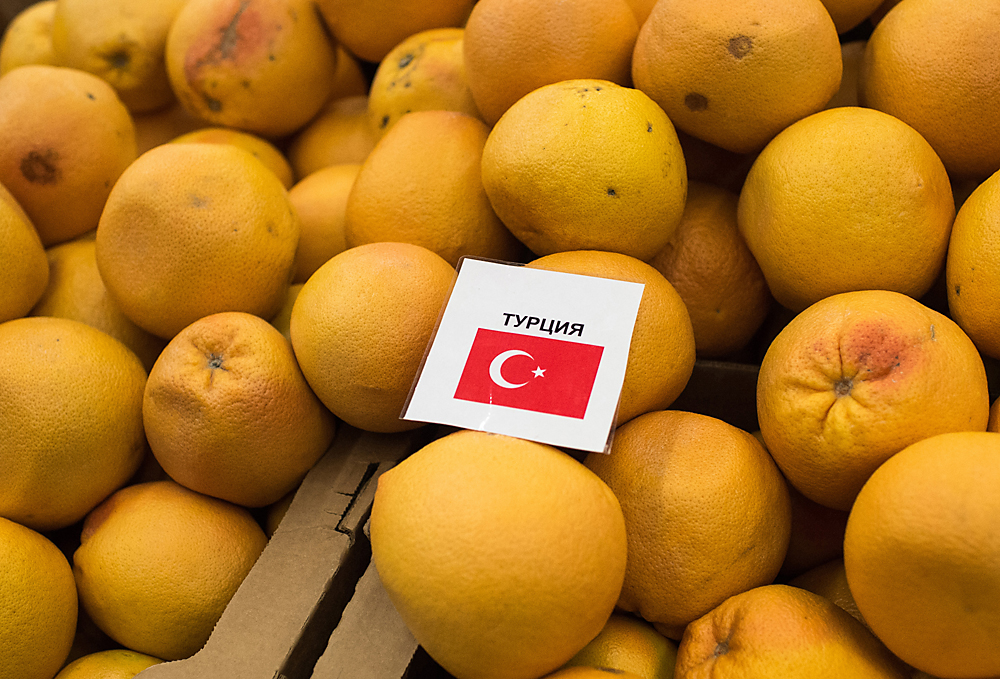
For a long time, Turkey was the main supplier of fruits and vegetables to Russia, but during the first seven months after the rupture in trade, their supplies were embargoed.
Alexey Malgavko/RIA NovostiTurkey and Russia appear to be close to reconciliation. On June 29, 2016 Russian President Vladimir Putin is scheduled to talk on the phone with the Turkish President Recep Tayyip Erdogan for the first time since November 2015, when the Turkish Air Force shot down a Russian Su-24 bomber near the Turkish-Syrian border. Several days ago on June 27 the Turkish leader apologized for the downed Russian plane.
According to experts, there are objective reasons for a possible reconciliation between Russia and Turkey. The rupture of relations has hit both countries hard.
"Turkey itself has assessed the losses from the sanctions at $9 billion a year,” Georgy Vashchenko, head of Russian stock market operations at the Freedom Finance investment company, told RBTH. “This is about 1.2 percent of its GDP."
The largest losses, according to Vashchenko, were in tourism revenues at more than $5 billion. The losses in connection with textile exports amounted to more than $1.2 billion a year. According to Russian estimates the reduction in turnover due to sanctions is more than $11 billion, he added.
Turkey is Gazprom's second largest market after Germany. In 2015, Russia's Gazprom delivered 26.9 billion cubic meters of natural gas to Turkey, which accounts for 55 percent of its needs.
Moreover, in December 2014, Gazprom and the Turkish company BOTAS signed a memorandum on the construction of a second gas pipeline under the Black Sea, the Turkish Stream, with capacity of 63 billion cubic meters of natural gas per year. After the rupture of relations between Turkey and Russia, the project was shelved. However, Turkey was unable to find alternative suppliers of natural gas and continued to buy Russian gas from existing pipelines.
In the case of the normalization of relations between the two countries, Gazprom is now open to a dialogue on the Turkish Stream, according to a recent announcement by the Russian company.
The most valuable foreign asset of state-owned Sberbank, Russia's largest bank, is located in Turkey. In June 2012, Sberbank bought Turkey's DenizBank for $3.5 billion. From a financial point of view, the investment has not been very successful: the capitalization of the Turkish bank has been constantly decreasing since then. In June 2016, DenizBank's capitalization plummeted to $2.6 billion.
According to Russian business newspaper Vedomosti, Sberbank was even willing to sell its foreign asset. However, officially, Sberbank has always denied rumors concerning the sale of DenizBank: it still accounts for about 9 percent of the Russian bank's assets.
Despite the development of domestic tourism, Russian tour operators were unable to find an alternative to Turkish hotels.
The number of searches on package holiday tours in May 2016 decreased by 15.5 percent compared to the same period in 2015, the Russian business daily Kommersant reported, citing analytical data of the Association of Tour Operators of Russia. According to the Association, 20 percent of these customers that stopped searching have been deciding not to go abroad at all in the absence of affordable foreign destinations.
"If there is a favorable decision on the resumption of cooperation with Turkey, holiday demand from Russian tourists could recover quickly," the Association said on its website.
After the breakdown in relations, Russia imposed a ban on the supply of major food products from Turkey. For a long time, Turkey was the main supplier of fruits and vegetables to Russia, but during the first seven months after the rupture in trade, their supplies were embargoed. As a result, according to data from the Ministry of Economic Development, food imports from Turkey in the first four months of 2016 decreased by $274.6 million compared with the same period last year – to be exact they decreased to zero. By comparison, before the imposition of sanctions on Turkey, almost 53 percent of the total tomato imports to Russia in cash and 54 percent through trade came from Turkey, the RBC business newspaper reported.
Construction firms from Turkey have implemented some of the most important projects in Moscow. For example, the company Enka renovated the building of the lower house of parliament, the State Duma, while Renaissance Construction built the office for Gazprom in St. Petersburg.
According to Kommersant, the aggregate turnover of Turkish real estate developers in Russia just recently totaled 50 billion rubles ($773 million) per year. After the deterioration of relations between the countries, Turkish companies have been allowed to complete only projects that had already commenced.
"The return of Turkish construction companies to Russia will be a step-by-step process, which will take at least several months," Finam's Deputy CEO Yaroslav Kabakov said.
All rights reserved by Rossiyskaya Gazeta.
Subscribe
to our newsletter!
Get the week's best stories straight to your inbox